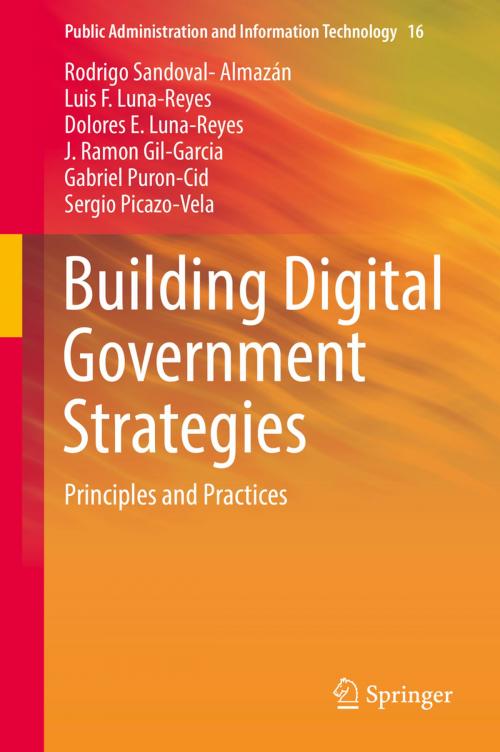Building Digital Government Strategies
Principles and Practices
Nonfiction, Reference & Language, Law, Administrative Law & Regulatory Practice, Social & Cultural Studies, Political Science, Government, Public Policy| Author: | Rodrigo Sandoval-Almazán, Luis F. Luna-Reyes, Dolores E. Luna-Reyes, J. Ramon Gil-Garcia, Gabriel Puron-Cid, Sergio Picazo-Vela | ISBN: | 9783319603483 |
| Publisher: | Springer International Publishing | Publication: | August 1, 2017 |
| Imprint: | Springer | Language: | English |
| Author: | Rodrigo Sandoval-Almazán, Luis F. Luna-Reyes, Dolores E. Luna-Reyes, J. Ramon Gil-Garcia, Gabriel Puron-Cid, Sergio Picazo-Vela |
| ISBN: | 9783319603483 |
| Publisher: | Springer International Publishing |
| Publication: | August 1, 2017 |
| Imprint: | Springer |
| Language: | English |
This book provides key strategic principles and best practices to guide the design and implementation of digital government strategies. It provides a series of recommendations and findings to think about IT applications in government as a platform for information, services and collaboration, and strategies to avoid identified pitfalls. Digital government research suggests that information technologies have the potential to generate immense public value and transform the relationships between governments, citizens, businesses and other stakeholders. However, developing innovative and high impact solutions for citizens hinges on the development of strategic institutional, organizational and technical capabilities. Thus far, particular characteristics and problems of the public sector organization promote the development of poorly integrated and difficult to maintain applications. For example, governments maintain separate applications for open data, transparency, and public services, leading to duplication of efforts and a waste of resources. The costs associated with maintaining such sets of poorly integrated systems may limit the use of resources to future projects and innovation. This book provides best practices and recommendations based on extensive research in both Mexico and the United States on how governments can develop a digital government strategy for creating public value, how to finance digital innovation in the public sector, how to building successful collaboration networks and foster citizen engagement, and how to correctly implement open government projects and open data. It will be of interest to researchers, practitioners, students, and public sector IT professionals that work in the design and implementation of technology-based projects and programs.
This book provides key strategic principles and best practices to guide the design and implementation of digital government strategies. It provides a series of recommendations and findings to think about IT applications in government as a platform for information, services and collaboration, and strategies to avoid identified pitfalls. Digital government research suggests that information technologies have the potential to generate immense public value and transform the relationships between governments, citizens, businesses and other stakeholders. However, developing innovative and high impact solutions for citizens hinges on the development of strategic institutional, organizational and technical capabilities. Thus far, particular characteristics and problems of the public sector organization promote the development of poorly integrated and difficult to maintain applications. For example, governments maintain separate applications for open data, transparency, and public services, leading to duplication of efforts and a waste of resources. The costs associated with maintaining such sets of poorly integrated systems may limit the use of resources to future projects and innovation. This book provides best practices and recommendations based on extensive research in both Mexico and the United States on how governments can develop a digital government strategy for creating public value, how to finance digital innovation in the public sector, how to building successful collaboration networks and foster citizen engagement, and how to correctly implement open government projects and open data. It will be of interest to researchers, practitioners, students, and public sector IT professionals that work in the design and implementation of technology-based projects and programs.















